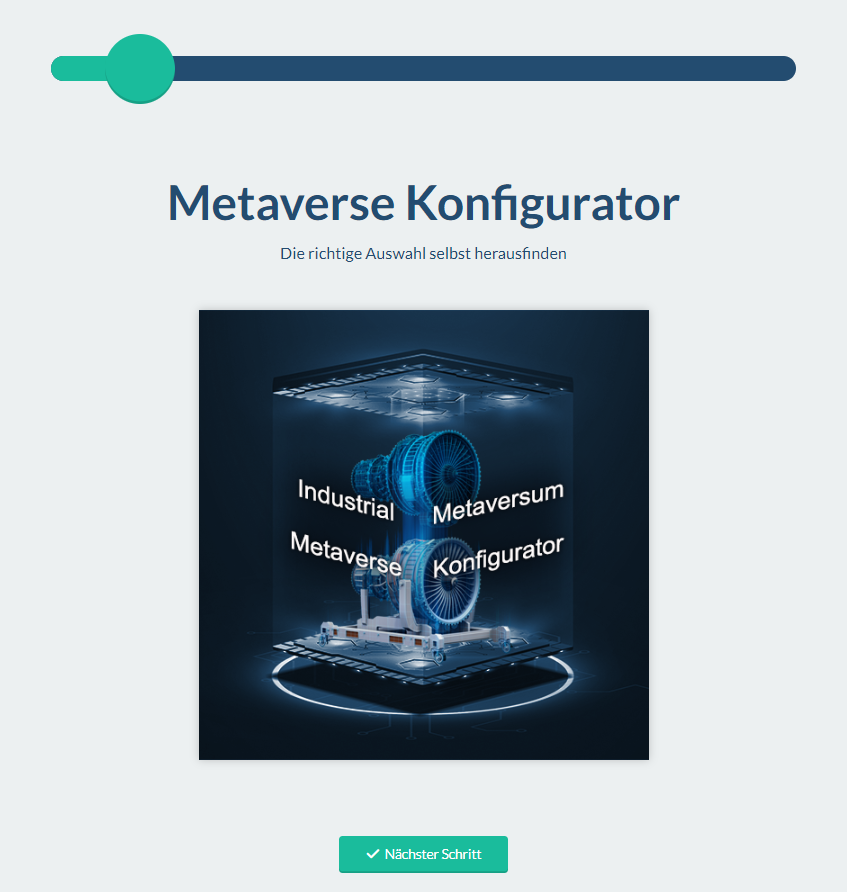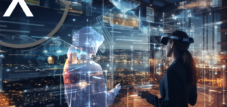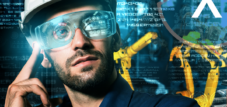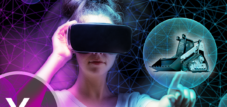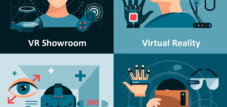It is only a matter of time before Industry 4.0 and the Metaverse will fully develop - a German concept is conquering the world
Language selection 📢
Published on: October 16, 2023 / update from: October 16, 2023 - Author: Konrad Wolfenstein
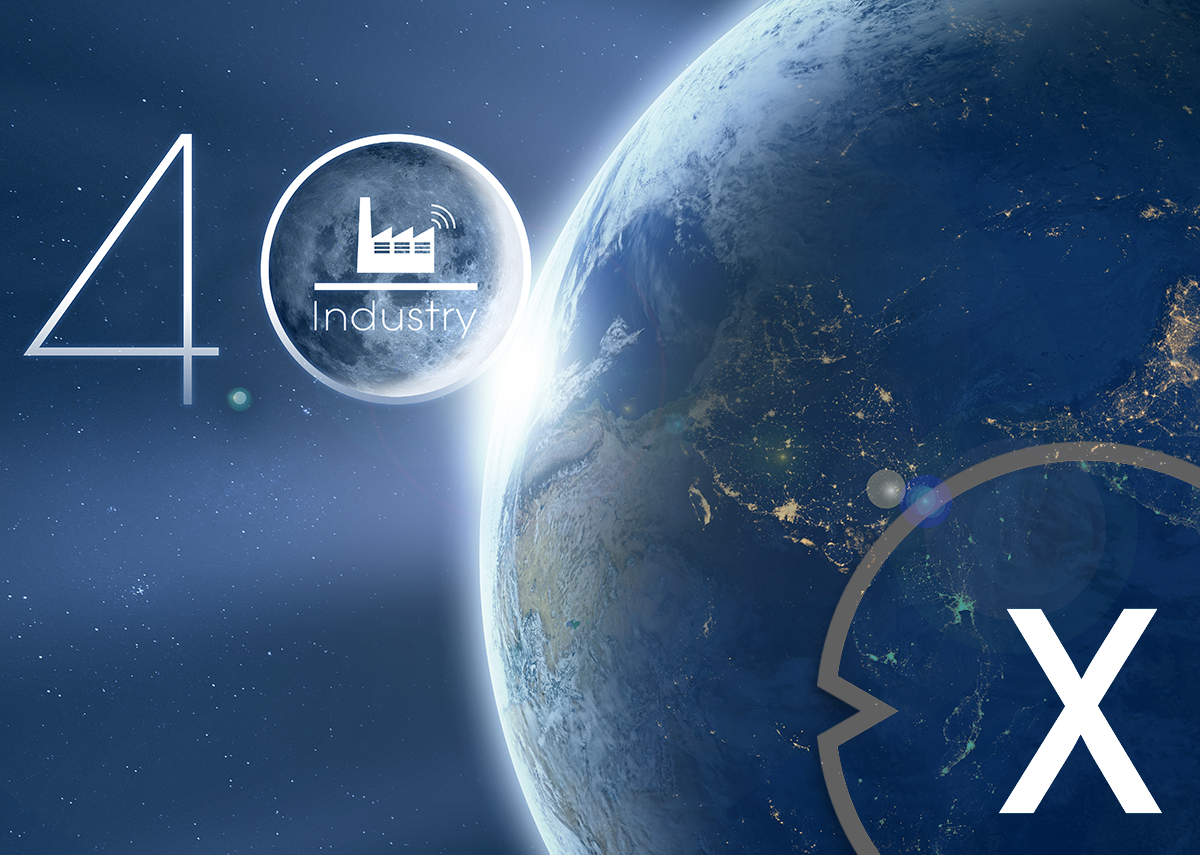
It is only a matter of time before Industry 4.0 and the Metaverse will fully develop – Image: Xpert.Digital
🏭 Industry 4.0: A German concept with global significance
Industry 4.0 is undoubtedly a term that has become increasingly important worldwide in recent years. But is it actually a concept that comes from Germany? The answer to this question is clear: Yes, Industry 4.0 is a concept that originated in Germany and from here has conquered the world.
🏭 The origins of Industry 4.0
Industry 4.0 refers to the intelligent networking of machines and processes in industry with the help of information and communication technology. This concept was first presented in 2011 at the Hannover Messe and has since revolutionized the way companies produce and work in industry. But how did Germany come to be the birthplace of Industry 4.0?
The roots of Industry 4.0 can be traced back to German industrial culture, which is characterized by a strong tradition in mechanical engineering and automation technology. Germany is known worldwide for its highly developed industry and its innovative strength in this area. This tradition of engineering and industrial production has prepared the breeding ground for the emergence of Industry 4.0.
🏭 The basic principles of Industry 4.0
Industry 4.0 is based on various basic principles that drive the digital transformation of industrial production. These principles are:
1. Networking
In Industry 4.0, machines and systems are networked with each other. This enables real-time communication and data transfer between the various components of production. This allows processes to be optimized and controlled.
2. Transparency
The networking creates a high level of transparency about the condition and performance of the production systems. This transparency makes it possible to react to problems at an early stage and increase efficiency.
3. Decentralization
Industry 4.0 enables decentralized decision-making. This means that machines and systems are able to make decisions autonomously, for example to adjust production processes or plan maintenance work.
4. Real-time capability
In Industry 4.0, data is processed in real time. This allows companies to react quickly to changes and flexibly adapt their production.
🏭 The impact of Industry 4.0
The introduction of Industry 4.0 has far-reaching effects on industrial production and the economy in general. Here are some of the key impacts:
1. Increased efficiency
Industry 4.0 enables a significant increase in efficiency in production. By optimizing processes and reducing downtime, companies can reduce their production costs.
2. Innovation
The networking of machines and the availability of real-time data open up new opportunities for innovation. Companies can develop new products and services based on the data and insights from connected production.
3. Flexibility
Industry 4.0 makes production processes more flexible. Companies can react quickly to changes in demand and adapt their production accordingly.
4. Competitiveness
Companies that successfully introduce Industry 4.0 generally become more competitive. You can bring products to market faster and offer customers tailored solutions.
🏭 The international spread of Industry 4.0
Although Industry 4.0 originated in Germany, the concept has quickly spread beyond the country's borders. Companies and governments around the world have recognized the benefits of Industry 4.0 and are investing in the digital transformation of their industries.
In China, for example, the concept of “Made in China 2025” was developed, which is strongly inspired by the principles of Industry 4.0. In the United States, there are also initiatives to promote Industry 4.0, especially in the area of industrial automation.
The international spread of Industry 4.0 shows that this concept is relevant not only in Germany but worldwide and has a profound influence on the way companies produce and do business.
🏭 Challenges and opportunities for Germany
While Germany, as the birthplace of Industry 4.0, is taking a pioneering role in the digital transformation of industry, there are also challenges ahead. One of these challenges is managing the privacy and security aspects of connected production. With the increasing networking of machines and systems, the risk of cyber attacks also increases.
Another aspect is the need to prepare the workforce for the requirements of Industry 4.0. New skills and competencies are required to fully exploit the possibilities of Industry 4.0. This requires investments in the training and further education of specialists.
On the positive side, Industry 4.0 offers Germany the opportunity to consolidate its position as a leading industrial nation and continue to offer innovative products and solutions. Through close cooperation between companies, government and educational institutions, Germany can maintain and expand its competitiveness.
🏭 Leading the way in development
Industry 4.0 is undoubtedly a German concept that has revolutionized the way companies produce and work. With its core principles of connectivity, transparency, decentralization and real-time capability, it has attracted global attention and driven the digital transformation of the industry.
Germany has taken a pioneering role in the development and implementation of Industry 4.0, but at the same time there are challenges that need to be overcome. However, the international spread of the concept shows that Industry 4.0 is not just a German concept, but is relevant and important worldwide.
The future of industrial production will undoubtedly be shaped by Industry 4.0, and Germany will continue to play an important role in this development. It will be exciting to see how this concept will develop in the coming years and what innovations it will bring about.
📣 Similar topics
- 🏭 The roots of Industry 4.0: German industrial culture
- 🌐 The basic principles of Industry 4.0
- 📈 The impact of Industry 4.0 on efficiency
- 🚀 Industry 4.0 and innovation: new possibilities
- 🔄 Flexibility through Industry 4.0 in production
- 💼 Competitiveness through Industry 4.0
- 🌍 International spread of Industry 4.0
- 🔐 Challenges: Privacy and security
- 📚 Education for Industry 4.0: Skills and Competencies
- 🇩🇪 Germany as a pioneer in Industry 4.0
#️⃣ Hashtags: #Industrie40 #GermanInnovation #Digitalization #Competitiveness #InternationalDissemination
🌐 Industry 4.0: A look at the German concept and its development in other countries
The fourth industrial revolution, also known as Industry 4.0, has significantly changed the way we produce. The concept originally from Germany has become more important in recent years worldwide. In this article we take a closer look at the “German” Industry 4.0 concept and progress in other countries such as the USA, China, Japan and Europe.
🇩🇪 1. The German Industry 4.0 concept
Industry 4.0 is a term that was first presented in 2011 at the Hannover Messe. It refers to the vision of intelligent and connected production in which machines, systems and people communicate with each other via the Internet of Things (IoT). This enables more efficient production, faster adaptability and better use of data for decision-making.
Germany is considered the birthplace of Industry 4.0, and the country has made significant efforts to implement this concept in recent years. German companies, particularly in the automotive and manufacturing industries, have advanced the integration of IoT technologies. This has led to improved productivity and competitiveness.
🇺🇸 2. Developments in the USA
The United States has also embraced Industry 4.0, although with a slightly different approach. The USA is increasingly relying on the digitalization and automation of production processes. Technology companies like Google, Amazon and Tesla are leaders in developing smart manufacturing solutions.
An important difference is that the US is not only focused on manufacturing, but also on integrating Industry 4.0 into areas such as healthcare, logistics and agriculture. This broader application of Industry 4.0 principles promises to increase U.S. competitiveness across various sectors.
🇨🇳 3. China and its ambitions
China has made massive efforts in recent years to take on Industry 4.0. The “Made in China 2025” program is a central element of these efforts. It aims to turn China into a global leadership in high technology sizes by relying on advanced manufacturing practices.
Chinese companies such as Huawei and Alibaba are investing heavily in research and development in IoT and artificial intelligence (AI). The Chinese government is actively supporting these efforts and creating incentives for companies to invest in smart manufacturing technologies.
🇯🇵 4. Japan and its tradition of innovation
Japan, known for its tradition of innovation, has also embraced Industry 4.0. Companies like Toyota are pioneering the implementation of IoT and robotics in their production processes. The principles of Industry 4.0 help Japan consolidate its position as a leading industrial nation.
However, Japan also has his own digitization approaches based on the so -called “Society 5.0”. This is not just about networking production, but also about improving the quality of life of citizens through technology.
🇪🇺 5. Europe and its diversity
Europe as a whole has different approaches to Industry 4.0. Countries like Germany and France are leading the way in implementation, while other nations are still catching up. The European Union has launched initiatives to promote the development of Industry 4.0 in all member states.
The diversity in Europe is also reflected in the various sectors that benefit from Industry 4.0. While Germany is a leader in mechanical engineering and the automotive industry, Sweden is focusing on developing IoT solutions for the forestry industry.
🌍 6. Shared challenges and opportunities
Despite the different approaches and progress in different countries, they all face similar challenges and opportunities:
Security
As production systems become increasingly interconnected, the threat of cyber attacks increases. All countries must therefore invest in cybersecurity and develop robust protection mechanisms.
qualification
Implementing Industry 4.0 requires a highly skilled workforce who is familiar with the new technologies. Education systems need to be adapted to provide the necessary skills.
standardization
Global standardization of IoT protocols and technologies is critical to ensure interoperability and facilitate global trade.
data protection
With the abundance of data generated in networked production processes, data protection issues are of great importance. Data protection laws and policies need to evolve to ensure privacy protection.
Competition and collaboration
The competition between countries and companies in the implementation of Industry 4.0 is intense. At the same time, there are opportunities for international cooperation to develop common standards and benefit from the strengths of different regions.
🔍 7. Progress
Industry 4.0 has revolutionized the world of production and manufacturing, and Germany can be proud that it has paved the way. Progress in the US, China, Japan and Europe shows that this concept has global influence. Each country is pursuing its own strategy to reap the benefits of Industry 4.0 while facing common challenges.
The future will show which approach is most successful and how collaboration between nations will further advance the development of Industry 4.0.
📣 Similar topics
- 🏭 Industry 4.0: Global developments and trends
- 🇩🇪 Germany: The origin of Industry 4.0
- 🇺🇸 USA: The digital transformation of production
- 🇨🇳 China: Towards technological leadership
- 🇯🇵 Japan: Tradition meets innovation
- 🌍 Europe: Diverse approaches to Industry 4.0
- 🌐 IoT and security: challenges and solutions
- 🎓 Education for Industry 4.0: Qualifications in transition
- 📊 Standardization in the IoT world🔒 Data protection in networked production processes
#️⃣ Hashtags: #Industrie40 #IoT #Technology #Innovation #Globalization
🗒️ If you don't understand something or need advice, we also offer training and workshops
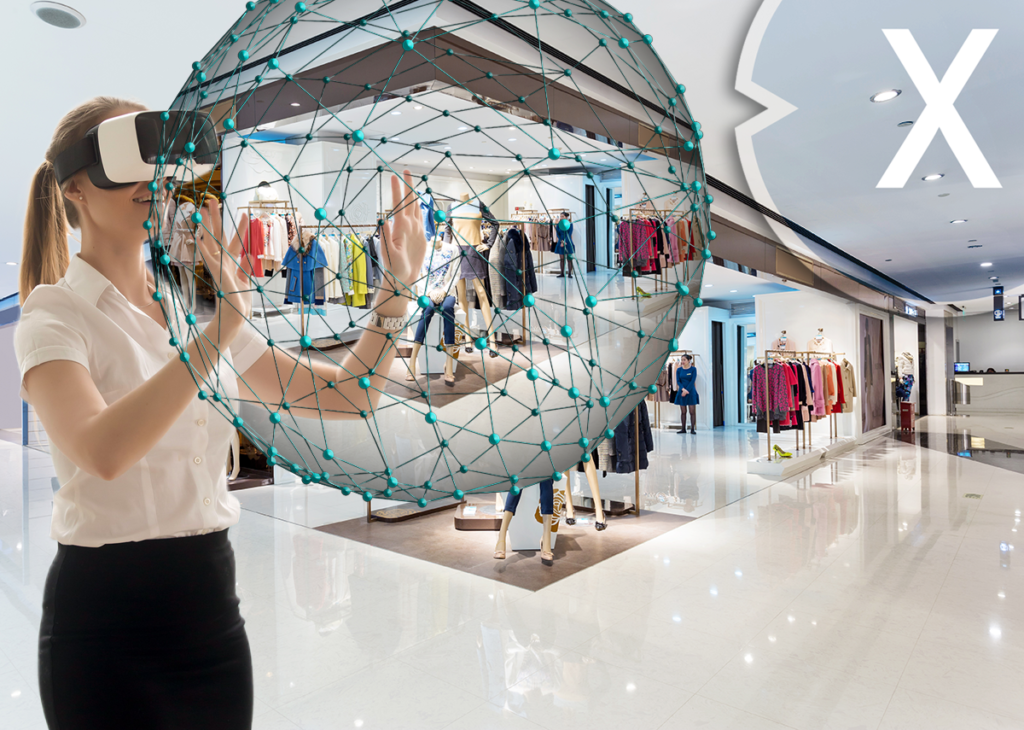
Metaverse & Extended Reality training, lecture or workshop for augmented, mixed and virtual reality – Xpert.Digital
In today's digital era, technology is evolving at a rapid pace. There are constantly new terms and technologies that need to be understood and mastered. If you're having trouble keeping up with topics like Metaverse, XR technologies, or immersive 3D, you're not alone.
More about it here:
📶🚀 🌐 Advances, Importance and Impact of Wireless Connectivity for Industry 4.0 and the Metaverse
Advances in wireless connectivity play a critical role in promoting and expanding Industry 4.0. This technological upsurge also has a direct impact on the Industrial Metaverse and is expected to drive significant changes in other Metaverse business models such as the Consumer Metaverse (V-Commerce/Virtual Shopping), the Customer Metaverse and the Business Metaverse.
📡 Importance of wireless connectivity in Industry 4.0
The importance of wireless connectivity in Industry 4.0 cannot be overemphasized. It enables seamless communication between different devices, machines and systems in production environments. This leads to a significant increase in efficiency, productivity and flexibility in manufacturing. Industry 4.0 represents the fourth industrial revolution, which focuses on the digitalization and networking of production processes. This shift toward smart, connected factories is being driven largely by improving wireless connectivity.
🌐 The Industrial Metaverse and its effects
The Industrial Metaverse is an emerging concept that merges the digital and physical worlds. It enables the creation of virtual images of physical production systems and processes. These virtual images, also known as digital twins, can be used to monitor, control and optimize real systems. The Industrial Metaverse also provides the ability to conduct training and education in virtual environments, significantly improving employee training and development.
💼 Impact on various Metaverse business models
The impact of the Industrial Metaverse extends beyond just manufacturing. It has the potential to revolutionize other Metaverse business models. Here are some areas where the Industrial Metaverse could have an impact:
1. Consumer Metaverse
The Industrial Metaverse could change the way consumers buy products online. By integrating virtual product presentations and interactive shopping experiences, customers could experience products in a virtual environment before purchasing them. This would take online shopping (V-Commerce/Virtual Shopping) to a new level and influence consumers' purchasing decisions.
2. Customer Metaverse
Companies could use the Industrial Metaverse to give their customers a deeper understanding of their products and services. By creating virtual training and presentations, customers could become better informed and build a closer bond with the products and brands on offer.
3. Business Metaverse
In the business world, the Industrial Metaverse could improve collaboration and communication between companies and their partners. Virtual meetings and conferences in a realistic virtual environment could increase the efficiency of business processes and reduce travel.
Suitable for:
🌐 Technologies in the context of the Industrial Metaverse
It is important to emphasize that the Industrial Metaverse does not exist in isolation, but rather within a larger context. The integration of 5G networks, advanced matrix codes and other technologies plays a key role in implementing this concept. These technologies enable the rapid transfer of large amounts of data in real time, which is crucial for the smooth functioning of the Industrial Metaverse.
🇩🇪 Development of the Industrial Metaverse in Germany
The development of the Industrial Metaverse has already begun in Germany and other industrialized nations. It is part of the effort to strengthen the competitiveness of German industry as part of Industry 4.0. German companies are increasingly relying on innovative technologies to optimize their production processes and remain competitive in the global economy.
🛠️ Areas of application and benefits
Insights into the Industrial Metaverse show that this is more than just a technological gimmick. It is a strategic step to increase efficiency, product quality and innovation in the manufacturing industry. By creating digital twins, companies can better understand and optimize complex production processes. This leads to a reduction in scrap and errors, which in turn reduces production costs.
The Industrial Metaverse will also be crucial for employee training and development. Training in virtual environments allows workers to gain hands-on experience without entering physical facilities. This is particularly advantageous in safety-critical industries where realistic simulations of work processes are essential.
Another important aspect of the Industrial Metaverse is the possibility of remote maintenance and repair of systems. Technicians can be in virtual environments and monitor and maintain assets remotely. This saves time and money for companies and minimizes downtime.
🤝 Impact on the business metaverse
The influence of the Industrial Metaverse on the Business Metaverse, the business environment in companies, should also not be underestimated. Virtual meetings and conferences in realistic virtual spaces could fundamentally change the way business is conducted. The physical distance between business partners would become less and less relevant as virtual meetings enable the same interaction as physical meetings.
🌍 Potential
The Industrial Metaverse is an exciting development within Industry 4.0 and has the potential to transform not only the manufacturing industry, but also other Metaverse business models. Improving wireless connectivity is a driving factor for this development, as it forms the basis for the smooth functioning of the Industrial Metaverse. It remains to be seen how quickly this technology will be adopted in different industries, but one thing is certain: the world of the Metaverse is on the rise, and the Industrial Metaverse is playing a significant role in this development.
📣 Similar topics
- The future of Industry 4.0: The Industrial Metaverse 🌐
- Wireless Connectivity and Industry 4.0: A Revolution in Manufacturing 🔗
- Virtual realities in industry: The Industrial Metaverse in focus 👓
- From Wireless to Digital Revolution: The Industrial Metaverse in Action 📡
- Customer loyalty in the digital age: The customer metaverse 💼
- Virtual Shopping of the Future: The Consumer Metaverse 🛍️
- Virtual training and continuing education: The potential of the Industrial Metaverse 🎓
- Business transformation through the Business Metaverse 💹
- The role of 5G technology in the Industrial Metaverse 📶
- German innovations: pioneering role in the industrial metaverse 🇩🇪
#️⃣ Hashtags: #Industrie40 #IndustrialMetaverse #WirelessConnectivity #VirtualReality #5GTechnology
Our Industrial Metaverse configurator
Just try out our universally applicable (B2B/Business/Industrial) Metaverse configurator for all CAD / 3D demo options:
Xpert (B2B/Business/Industrial) Metaverse configurator for all CAD / 3D data can be used on all devices, one platform!
Suitable for:
🗒️ Xpert.Digital: A pioneer in the field of extended and augmented reality
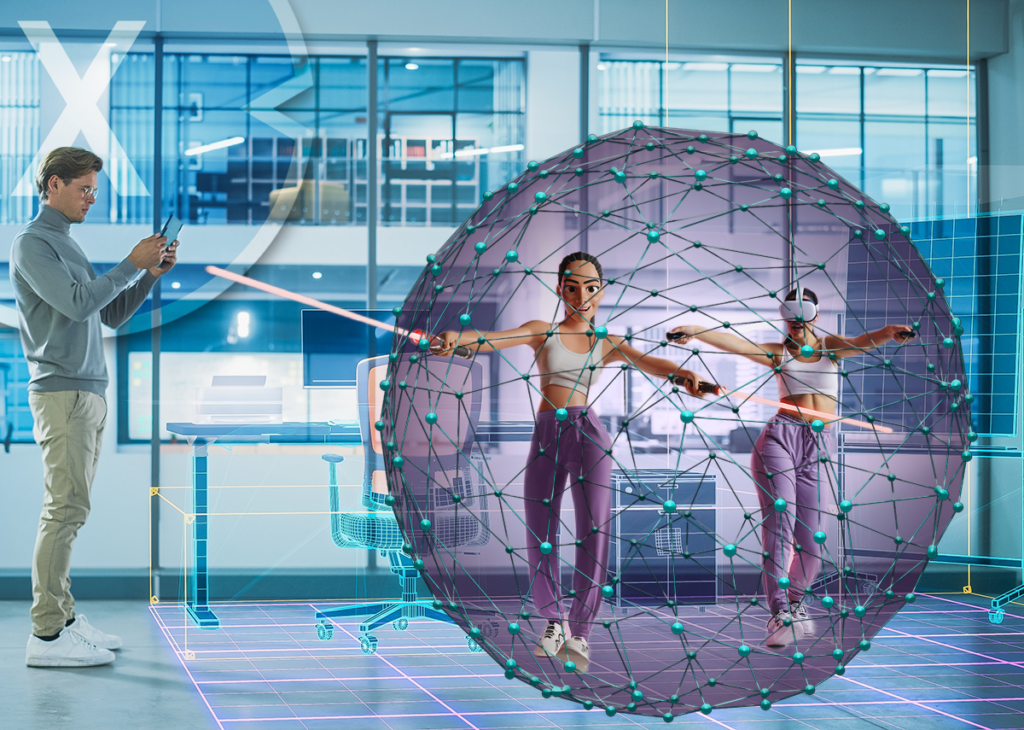
Find the right Metaverse agency and planning office such as a consulting firm - Image: Xpert.Digital
🗒️ Find the right Metaverse agency and planning office such as a consulting firm - search and search for top ten tips for consulting & planning
In the age of digitalization, where technologies such as Extended Reality (XR) and the Metaverse are constantly becoming more relevant, Xpert.Digital positions itself as an opinion leader and pioneer. With over 1,500 specialist articles, Xpert.Digital has established itself as a central point of contact for the industry.
🌌 Extended Reality (XR): The best of both worlds
Extended Reality is a collective term that includes virtual reality (VR), mixed reality (MR) and augmented reality (AR). Xpert.Digital is committed to creating immersive XR experiences that are both informative and entertaining.
- Interactive Experiences: XR allows users to immerse themselves in virtual worlds and interact with their surroundings in ways previously unimaginable.
- Education and Training: XR can be used for educational purposes to convey complex topics and concepts in an understandable and tangible way.
- Entertainment: Whether games, films or art – XR opens new horizons in digital entertainment.
🔮 Augmented Reality (AR): See the world through digital eyes
Augmented Reality, a particular focus of Xpert.Digital, makes it possible to integrate digital information or graphics into the real world. The possibilities are nearly unlimited.
- Marketing and Advertising: AR can be used to create interactive advertising campaigns that engage customers in a whole new way.
- Everyday help: From navigation apps that project the route directly onto the street to furniture apps that show what a new sofa would look like in the living room - AR makes it possible.
🌐 The Metaverse: The Next Big Thing
The Metaverse is a virtual world where people can interact through avatars and create shared experiences. Xpert.Digital recognizes the enormous potential of the Metaverse and is working to translate this potential into usable products and services.
- Social Interaction: The Metaverse offers the opportunity to connect with people from all over the world and share common experiences.
- Economy and trade: Virtual goods and services can be traded in the metaverse, which opens up completely new business models and sources of income.
- Creative Freedom: From building your own worlds to designing custom avatars, the Metaverse is a place of endless creative possibilities.
🚀 Xpert.Digital at the forefront of innovation
Xpert.Digital shows how a company can be at the forefront of the technological revolution. With their focus on XR, AR and the Metaverse, they are well positioned to shape and define the future of digital interaction.
More about it here:
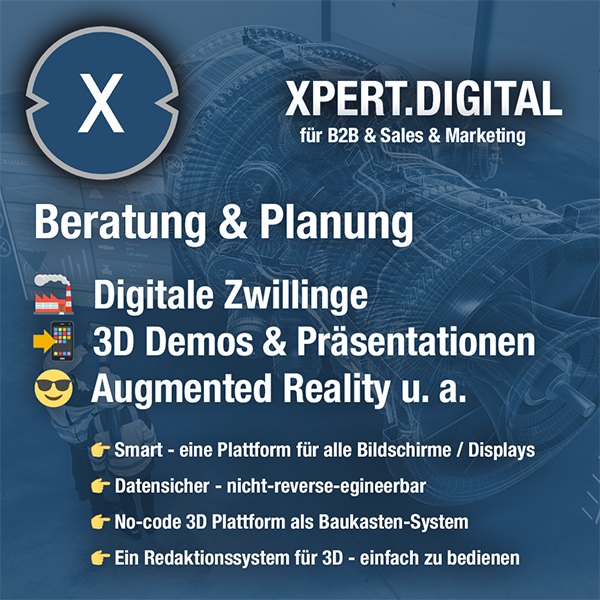
We are there for you - advice - planning - implementation - project management
Xpert.Digital - Pioneer Business Development
Smart Glasses & KI - XR/AR/VR/MR industry expert
Consumer metaverse or meta -verse in general
If you have any questions, further information and advice, please feel free to contact me at any time.
I would be happy to serve as your personal advisor.
You can contact me by filling out the contact form below or simply call me on +49 89 89 674 804 (Munich) .
I'm looking forward to our joint project.
Xpert.Digital - Konrad Wolfenstein
Xpert.Digital is a hub for industry with a focus on digitalization, mechanical engineering, logistics/intralogistics and photovoltaics.
With our 360° business development solution, we support well-known companies from new business to after sales.
Market intelligence, smarketing, marketing automation, content development, PR, mail campaigns, personalized social media and lead nurturing are part of our digital tools.
You can find out more at: www.xpert.digital - www.xpert.solar - www.xpert.plus



